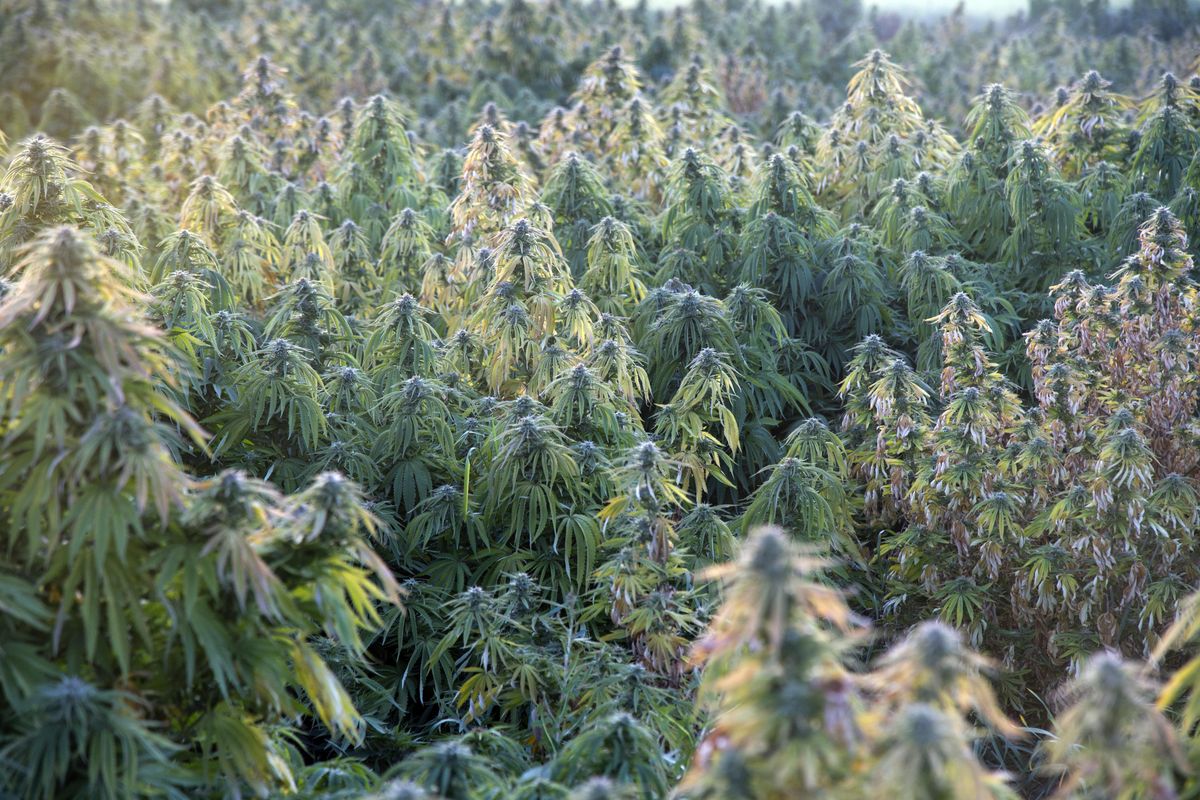Spokane County growers anticipate world’s largest marijuana harvest

Just a few years ago, the farm she owns with her husband, Kevin, would have landed the couple in prison. Today, she’s talking about experimenting with strains of marijuana to sell in a state industry on which consumers spent roughly $260 million in its first year.
“We’ve got five ‘Northern Lights’ here,” she said, pointing to browning plants that stick out from the pungent, leafy green stalks that dot a hillside plot. “You know, the name is really nice, and it sounds like something that would do well. But they aren’t happy at all.”
Crystal and Kevin Oliver, activists who helped push legalized marijuana in Washington, are among the dozens of area outdoor marijuana farmers who are preparing for harvest this month. Their company, Washington’s Finest Cannabis, contributed to the roughly 20 percent of the legal marijuana sold in the state grown in Spokane County, based on records from the Washington Liquor and Cannabis Board.
“I would wager that Spokane County, this year, will have the largest marijuana harvest the world has ever seen,” Oliver said.
Her bet is a sound one. State officials say they expect this year’s inventory to far outpace last year, based on the expansion of operations of farmers like the Olivers.
“We’re gearing up,” said Brian Smith, a spokesman with the Liquor and Cannabis Board.
In November 2014, producers statewide reported a harvest of 13,682 pounds of usable marijuana bud.
The Olivers will begin cutting the leaves of their plants this week, and the bud will be removed to be dried and cured, before being reported to state officials.
This summer’s dry conditions shouldn’t affect the primary strain the Olivers grow, Crystal Oliver said. It’s known as “Afghanica” and was originally grown in the arid hills of Afghanistan. The plant grows short and full, thriving in the plain winds of north Spokane County.
“The vast majority of the garden is this strain,” Oliver said. “We decided to go that direction, because what’s something you can’t get on the black market? A consistent product.”
Signals that the Olivers’ product remains in competition with illegal alternatives surround their plot. Cameras record every move inside the growing area and the product is surrounded by fencing. Visitors must sign in to a logbook, and the couple’s barn is full of reminders about the legal process of cutting, weighing and packaging the product.
The Olivers also will submit their product to rigorous testing for pesticides, though the company does not use them on their plants.
All the outdoor marijuana that will enter the market in the coming weeks is being met with cautious optimism by those involved in other aspects of the industry. Some shops won’t sell outdoor-grown marijuana because of opinions left over from the days when the drug was illegal in Washington, Oliver said.
“The outdoor marijuana that used to get into Washington was, maybe, the B- and C-grade out of California, that couldn’t be moved at its dispensaries,” she said. “I think in Washington, there’s this misconception that outdoor marijuana is a substandard product.”
Justin Wilson, who owns Satori in north Spokane, said he usually sees better quality in indoor-grown pot. But he’s open to stocking all types of marijuana.
“If it’s good herb, it’s good herb,” he said.
Justin Peterson, who runs two retail shops under the name Cinder, said his business is more interested in quality than whether the bud was grown under sunlight or artificial light.
“It’s generally cheaper than indoor because it doesn’t require as much electricity,” Peterson said. “So then we’re able to sell it at a cheaper price.”
Prices for a gram of legal marijuana have stabilized in Washington over the past couple of months, according to the Liquor and Cannabis Board. The average cost for a gram of marijuana in Washington has been between $11 and $12 since April.
That’s a nosedive from the original prices when sales began. That same gram of marijuana cost $25.12 in August 2014.
Peterson said he doesn’t expect prices to fall much further because businesses need to protect their profit margins. He said he’s more worried about the new round of business licenses that will be issued by the Liquor and Cannabis Board beginning later this month.
“This could create this massive glut of retail stores, and you could see a lot of shops going out of business quickly,” Peterson said.
Spokane County has 15 retail stores, which is the second-highest number in the state, according to a report this summer from the Washington Institute of Public Policy. That number includes Peterson’s two stores and Wilson’s shop.
What could be bad news for existing marijuana shops might be an opportunity for pot farmers trying to penetrate a growing market. Oliver said more stores would mean more shelf space for farmers, who have also been relieved of an excise tax that is now imposed exclusively on retailers.
“As of right now, with the limited number of stores, there was really a lot of downward pressure on the producers, as far as price is concerned,” Oliver said. “But I think with more competition at the retail level, the farmers should see better prices this year, and less pressure.”
Also in the Olivers’ favor is the knowledge of another year growing under the legal protection of Washington state law. The placement of plants, and procedures for the harvest, will all benefit from another year of learning, she said.
“It’s our second season in, so we’ve learned a lot,” she said. “And we’ve got a lot more product to bring to market.”